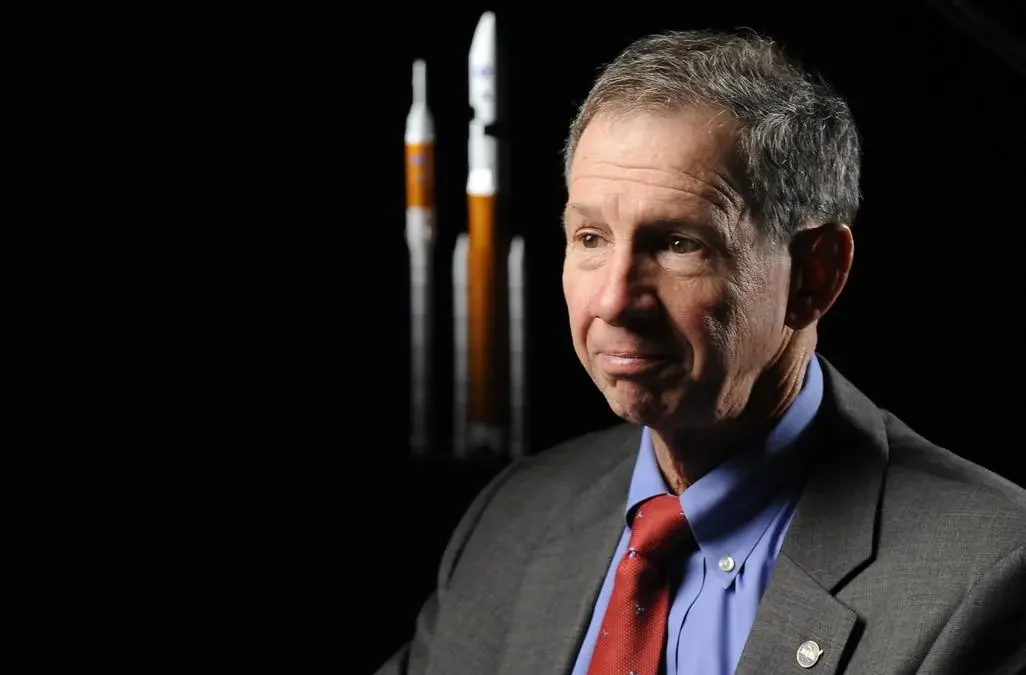by Christophe Bosquillon

At most conferences, there’s always the excuse of a plane to catch if you want to skip that last lunch keynote address. In the case of the latest von Braun Space Symposium thou, it would have been ill-advised. Mike Griffin delivered a compelling call to arms during the closing lunch of Symposium in Huntsville, which was held in Alabama, in late October 2023.
Griffin needs no introduction other than, as he himself mentioned, “there was a guy one time who stood up and introduced me by saying you can find out more about Mike on Google than he would ever want you to know.” Mike’s original 2007 paper in AWST served as kick-starter of his keynote address and ensuing discussion.
Griffin covered a lot of ground, from reevaluating space programs funding, to reassessing a viable space transportation architecture (the “Lunar Gateway to nowhere”). From fixing a broken procurement system between the extremes of commercial and government involvement, to reestablishing expert decision-making in government space exploration policy. From promoting fair competition among contractors, to securing vision and funding to attract and retain top talent. During the Q&A, when asked about the DARPA DRACO nuclear propulsion program, Mike viewed that situation as “DARPA giving NASA a slap upside the head to get them moving out. (…) I’m glad that’s going on but (…) it shouldn’t take DARPA to get the nation on the right course about exploring space.”
But what Griffin was really telling his audience at the von Braun Space Symposium was much simpler: “We are Americans, and we should be there first.”
Make America Great Again, again.
Here’s the conclusive part of Griffin speech:
“I’ve outlined some things that I think are wrong but which I believe are correctable. But until and unless they’re corrected, we’re not going to be going back to the Moon, we’re not going to Mars. I said I would take a minute or two to comment on why that matters.
I said earlier that I was tired of people who thought you could get usefully below low earth orbit without a heavy lifter. I’m also tired of people who think NASA is a civilian agency. It’s a civilian agency because Eisenhower wanted to distinguish the “Civil Space Program” from the “Military Space Program” as a response to the Soviet Union. But in practical terms NASA is a national security agency.
It is there to demonstrate the superiority of the American way of doing important things over other approaches. So that was Kennedy’s goal during Apollo, and it should be this nation’s goal now in the era of the rise of China. And of President Xi in China who routinely makes public statements that the Western democracies are bankrupt, have lost their way, are decadent. He asserts his intention that China should be the world superpower. When people tell you they’re out to get you, maybe you should pay attention.
You know maybe he’ll die first, and China will revert. It’s not how I want to place my bet. I don’t want to place my bet on that hand okay. The consequences to the world order of China being on the Moon when the United States cannot even get there are profound. They will be profound. I’m old but I expect to be alive when they land and I want us to be there to greet them, not watching it on TV.
NASA is a national security agency in every aspect of our space program, meaning taxpayer funded space program. I’m not talking about commercial comsats, which are great. But that’s not what I’m talking about.
Every aspect of our taxpayer funded space program, whether it’s a black program at the NRO, or a civilian scientific robotic Mission to Mars, is a national security program. Because it’s about the standing of the United States in the global arena.
That is what it’s about and if we can do some useful things in conjunction with that, I think that’s great. I worked on Hubble. As I’ve said many times to different groups, I’m proud of having worked on Hubble. It was awesome, but sorry scientists, Hubble was a national security program. It’s all about “we’re better than you”. And if that sounds jingoistic, I don’t care.”
The spirit of the von Braun Space Symposium
The last thing we want to do here is to pass judgement on Griffin’s à-propos. However, no speaker had uttered “China!” before Griffin did. At the time of publishing, the U.S.-China Economic and Security Review Commission has recently released a 741-page report stating that “the new normal is one of continuing, long-term strategic and systemic competition” between the US and China. Anyone paying attention did notice this has been going on for a couple of decades already. Space does play a central role in China’s expanding global clout and modernizing military.
The NASA-driven spirit of von Braun is strongly national and even domestic and to a certain extent inward-looking. It feels like the rest of the world doesn’t really exist, save for a quick reference to ESA’s role in the Lunar Gateway, and broad allusions to “our great international partnerships”, that’s all. There were fascinating insider-oriented discussions about NASA’s organizational politics, and the difficulties of dealing with the private sector. There was genuine acknowledgement of the complexities of the Artemis program. Space is hard, the Moon is harder, Mars is far. Any other nation going there faces the same laws of physics and challenges to demonstrate its ability to deliver the goods.
There were moments the pretty much engineering-driven conversations could have been interpreted as not really concerned that we are in a “race” back to the Moon, that we should be running faster. There were also hints that the ISS retirement date might be postponed beyond 2030, out of concern for managing the transition to commercial replacements. The issue of availability of such commercial space stations as early as 2028 does sound a bit tight. Griffin provided a much needed breath of fresh, outward-looking air.
America vs. China vs. the rest of the world
What difference does it make depends a bit on where one is in this world. Whether one wants to see America or China “win” depends on one’s personal views. However, “the rise of the rest” does indeed matter. The “15 minutes of terror” when attempting a Moon landing can be for the whole of humanity, even if that’s not our flag on the spacecraft. Today we root for Team Japan, and for Team India. Tomorrow, we shall root for Teams Middle East, Africa, Latin America, as they steadily rise their space game. With “Emerging Space Countries”, among which there are both advanced economies, and societies in need of building much capacity, we should ride-share until they can reach for the stars on their own.
We lean toward the young and hungry to get there at a fraction of the cost it takes for bloated armies of bureaucrats in established space administrations to get it done by space corporate fat cats. Griffin was spot on. But if the laws of economics would apply as harshly to the space domain as the laws of physics do, then India’s and others’ well-managed and far less costly space programs might get an edge. We bet America will remain the dominant space power though, even if doing so despite itself.
The European sleepiness
As for Europe, there is no way one can keep allowing the “falling behind syndrome” to persist. This requires hard questions, harder answers, and necessary adjustments. After Seville, Bremen has provided a powerful follow-up call to the necessities of reforming the European way of doing space business. It has long been acknowledged that in some situations the “georeturn” system has become counterproductive. One of such most glaring problems is the near impossibility to restructure some of the supplier base for Ariane 6, as acknowledged by Philippe Baptiste, chief executive of the French space agency CNES, and Pierre Godart, chief executive of ArianeGroup Germany.
However, the politico-economic model of the European Space Agency is intrinsically subordinated to georeturn. That formula is the incentive for states to contribute, in exchange of using the money back home: kill it and ESA is a goner. Walther Pelzer, director-general of DLR, the German Space Agency, proposed what sounds like a reasonable compromise: fine tune how and where to apply georeturn. When it comes to assessing European space ambitions strategically, picking one’s fights, focusing one’s means on wisely selected goals, Pelzer’s smart realism should be taken in consideration.
Love of the game
The national interest will prevail for as long as Europe is made of nation-states. But a Europe unable to strategically combine its strengths and leverage its unique attractivity will fail to lead. Europe is in this game to lead, not to follow.
We are in this game to compete and to be an inspiration to the rest of the world to come on board and ride-share and join forces. We should not be in this game because we believe our flags, or our cultural values, are so much better they should be imposed to the rest of the world as one-size-fits-all. We should be in this game because we believe in the value of international cooperation, because we refuse the foregone conclusion reducing world affairs down to the frozen geopolitics of block confrontation. We should believe that a Europe that attracts Emerging Space Countries, including the Global South, is worth fighting for.
As Europeans, our philosophy is different from the one exposed by Griffin. It’s not about being better than you. It’s about being better off with you rather than without you. And if that doesn’t sound jingoistic enough, that’s precisely because we care.

Christophe Bosquillon has a diverse professional background, having operated globally with a focus on the Indo-Pacific region. His experiences in Japan, the Koreas, Taiwan, China, ASEAN, India, Russia, and Australia have given him a deep understanding of the multipolar realpolitik of our world under the Pax Americana. With a background in engineering, trade, and foreign direct investment in industries relevant to Space Resource Utilization (SRU), such as mining, transportation, energy, manufacturing, agrifood, environment, and digitalization, Chris is committed to developing SRU value chains that benefit the Earth. As an executive, owner, writer, and founder of Autonomous Space Futures Ltd, Chris has extensive experience in collaborative policy crafting and works to develop space business and governance models relevant to society. He is a member of NGOs that provide input to the United Nations Committee on the Peaceful Uses of Outer Space (UNCOPUOS) legal subcommittee Working Group on Space Resources. Chris contributes to regulatory clarity on appropriation, priority, sustainability, and sharing in a way that balances national interests with civil society inclusion, provided a transparent due process is followed. When advocating for access to technology and space for the Global South, Chris believes that emerging space powers’ participation in space markets must be commensurate with their interest and involvement in international space politics. He believes that their ability to develop sovereign domestic capabilities with spillover potential is also essential. Chris is keen on ‘Peace Through Strength’ diplomacy and deterrence-based security as enablers of secure space access. He supports sovereign cislunar space situational awareness as mandatory for freedom of circulation in the space domain and deconflicted cooperation on the Moon.
 SpaceWatch.Global An independent perspective on space
SpaceWatch.Global An independent perspective on space




